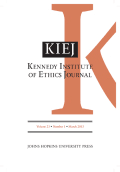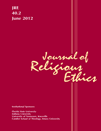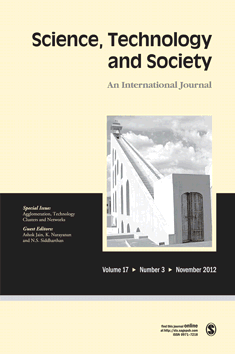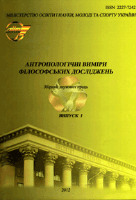
NanoEthics
Scope & Guideline
Unraveling the Socio-Ethical Dimensions of Nanotechnology
Introduction
Aims and Scopes
- Interdisciplinary Ethical Analysis:
The journal aims to provide a platform for interdisciplinary discussions on the ethical implications of nanotechnology, incorporating insights from philosophy, sociology, law, and environmental studies. - Societal Impact of Emerging Technologies:
NanoEthics explores how emerging technologies like gene editing, artificial intelligence, and quantum technologies affect society, emphasizing the need for ethical considerations in their development and deployment. - Public Engagement and Citizen Science:
The journal promotes research that investigates public perceptions and the role of citizen engagement in the governance of nanotechnology and related fields. - Regulatory and Policy Frameworks:
A key focus is on the normative challenges of regulating emerging technologies, considering how policy can effectively address ethical dilemmas and societal concerns. - Technological Interventions and Human Enhancement:
The journal addresses the ethical implications of technological enhancements and interventions in human biology, examining the moral and philosophical dimensions of such advancements.
Trending and Emerging
- Ethics of Artificial Intelligence (AI):
There is a growing focus on the ethical implications of AI technologies, particularly in relation to their integration with nanotechnology and neuroethics, reflecting the broader societal concerns regarding AI governance. - Gene Editing and Biopolitics:
The ethical debates surrounding gene editing technologies, particularly regarding their implications for biopolitics and environmental ethics, have gained significant traction, indicating a critical area of inquiry. - Interdisciplinary Approaches to Sustainability:
Emerging themes emphasize the importance of interdisciplinary research that connects sustainability with ethical considerations in technology development, particularly in the context of climate change and societal resilience. - Reflexive Practices in Technology Assessment:
There is an increasing interest in reflexive practices and participatory dialogues that involve stakeholders in the technology assessment process, highlighting a shift towards inclusive governance models. - Cultural Representations of Technology:
Recent explorations into how nanotechnology and related fields are represented in popular culture, including art and media, suggest an emerging interest in understanding public narratives and perceptions.
Declining or Waning
- Traditional Risk Assessment:
There has been a noticeable decrease in papers focused solely on traditional risk assessment methodologies for nanotechnology, suggesting a shift towards more holistic and integrative approaches that consider broader societal implications. - Narrow Technological Focus:
Topics that solely emphasize the technical aspects of nanotechnology without considering ethical or social implications have become less frequent, indicating a shift towards more interdisciplinary and ethical discussions. - Static Normative Frameworks:
The exploration of static normative frameworks for technology ethics appears to be waning, with a growing preference for dynamic, context-sensitive approaches that account for rapid technological changes.
Similar Journals

Teoria-Rivista di Filosofia
Illuminating Contemporary Philosophical ChallengesTeoria-Rivista di Filosofia is a distinguished academic journal published by EDIZIONI ETS, based in Pisa, Italy. With a focus on philosophical discourse, this journal is a valuable resource for researchers, professionals, and students in the field of philosophy. Having achieved a commendable Q3 ranking in the 2023 category quartiles, Teoria stands out in the competitive landscape of philosophy journals, with a Scopus rank of #612 out of 806, placing it in the 24th percentile. Although currently classified as a non-open access publication, it frequently addresses cutting-edge themes and challenges within philosophical research, promoting rigorous analysis and diverse perspectives. The journal spans various topics across multiple issues from its inception in 2011 to its ongoing publications scheduled through 2024, making it a relevant venue for contemporary philosophical inquiry. The journal aims to foster scholarly communication and stimulate critical debates, contributing significantly to the global philosophical landscape.

EDUCATIONAL THEORY
Fostering Scholarly Conversations in Educational TheoryEDUCATIONAL THEORY is a prestigious journal published by Wiley, focused on advancing the field of education through critical and insightful research. With an ISSN of 0013-2004 and E-ISSN 1741-5446, this journal has been a cornerstone of educational scholarship since its inception in 1951. Positioned in the second quartile (Q2) of the Education category and ranked #747 out of 1543 in Social Sciences - Education according to Scopus, it reflects a commitment to high-quality, peer-reviewed contributions that explore theoretical frameworks, methodologies, and contemporary issues in education. While not open access, it provides access options for educational institutions and researchers, facilitating a wide dissemination of knowledge. Covering converged years until 2024, EDUCATIONAL THEORY aims to engage researchers, professionals, and students alike, fostering a dialogue that enhances understanding and practice in educational theory.

LAW AND PHILOSOPHY
Illuminating the Foundations of Justice through PhilosophyLaw and Philosophy is a distinguished academic journal published by Springer, focusing on the intersection of legal studies and philosophical inquiry. With an esteemed impact factor reflecting its influence in the field, the journal has achieved notable ranks, placing it in Q2 in Law and Q1 in Philosophy as of 2023. Readers can access it through institutional subscriptions, emphasizing its role in enriching debates around law's philosophical underpinnings. This journal, with its inception in 1982 and continuing through 2024, provides a platform for innovative ideas, fostering dialogue among researchers, professionals, and students. It aims to publish cutting-edge articles that challenge existing doctrines and propose new theoretical frameworks, making it essential for anyone engaged in the critical study of law and its philosophical ramifications.

Global Philosophy
Illuminating Contemporary Issues Through Global PhilosophyGlobal Philosophy, published by Springer, is a pioneering academic journal aimed at advancing the interdisciplinary dialogue within the field of philosophy on a global scale. With its dedicated ISSN 2948-1538 and E-ISSN 2948-152X, this journal provides a valuable platform for researchers and scholars to explore diverse philosophical traditions and contemporary issues affecting our interconnected world. As an Open Access publication, Global Philosophy ensures that cutting-edge research is readily accessible to a wide audience, fostering collaboration and innovation across disciplines. The journal encourages contributions that address both theoretical and practical implications of global philosophical inquiries, making it an essential resource for academics, professionals, and students committed to understanding the complexities of human thought in a global context. Engage with Global Philosophy and contribute to the evolving conversation on the myriad influences of global perspectives in philosophy.

KENNEDY INSTITUTE OF ETHICS JOURNAL
Fostering Rigorous Debate on Ethical Dimensions of HealthThe KENNEDY INSTITUTE OF ETHICS JOURNAL, published by the prestigious Johns Hopkins University Press, stands as a leading periodical in the realm of ethics, particularly emphasizing the intersection of health policy, social sciences, history, and philosophy of science. With an ISSN of 1054-6863 and an E-ISSN of 1086-3249, this journal has been a cornerstone of ethical discourse since its inception in 1991. Renowned for its rigorous peer-review process, the journal boasts impressive rankings, including Q1 in History and Philosophy of Science and Q2 in Health (Social Science) for 2023. Researchers, professionals, and students alike will find this journal invaluable for navigating complex ethical issues, providing a platform for innovative research and discourse. Although currently not offering Open Access, its contributions to the fields of ethics and legal aspects of health are profound, making it an essential resource for those engaged in these critical discussions.

JOURNAL OF RELIGIOUS ETHICS
Empowering Researchers to Explore Ethical FrontiersJOURNAL OF RELIGIOUS ETHICS is a premier academic journal dedicated to fostering scholarly discourse within the field of religious studies, specifically focusing on moral theory and its implications in various religious contexts. Published by Wiley, the journal showcases rigorous research and theoretical exploration related to ethical dimensions of religion, contributing significantly to the broader understanding of moral philosophy. With an impressive 2023 impact factor placing it in the Q1 category of religious studies and a commendable Scopus rank of 126 out of 644, it is positioned amongst the top-tier journals in its field, reflecting its influence and the high quality of its manuscripts. The journal welcomes diverse perspectives and interdisciplinary approaches, making it an essential resource for researchers, educators, and practitioners seeking to deepen their understanding of the ethical implications of various religious traditions. Serving a global audience from its UK base, the JOURNAL OF RELIGIOUS ETHICS continues to be an indispensable platform for innovative scholarship and dialogue.

Science Technology and Society
Illuminating the Interplay of Science and Social ChangeScience Technology and Society is a premier multidisciplinary journal published by SAGE Publications India Pvt Ltd, focusing on the intersection of scientific advancements and societal implications. With its ISSN of 0971-7218 and E-ISSN of 0973-0796, the journal is recognized for fostering scholarly discourse and critical analyses from diverse perspectives, serving as a vital resource for researchers, professionals, and students alike. With a distinguished Q1 category ranking in the multidisciplinarity discipline and an impressive 79th percentile among 171 journals, it stands out for its rigorous peer review process and impactful contributions to the field. The journal has been in continuous publication from 1996 to 2004 and from 2006 to 2024, underlining its ongoing relevance and commitment to exploring how technology shapes society and vice versa. Although currently offering subscription access, it remains dedicated to providing researchers with innovative insights that bridge gaps between technology and social contexts, making it an essential addition to the academic community's libraries.

Balkan Journal of Philosophy
Connecting Minds Across the Balkan RegionBalkan Journal of Philosophy, published by ACAD PUBL HOUSE, stands as a significant contribution to the field of philosophy, particularly within the Balkan region. With an ISSN of 1313-888X and an E-ISSN of 2367-5438, this journal aims to advance philosophical discourse and scholarship from 2017 to 2024, making it a vital platform for emerging ideas and scholarly debates. Despite its emerging status, it holds a respectable Q3 quartile ranking and is positioned in the 22nd percentile for Arts and Humanities in Scopus, reflecting its growing impact in the academic community. Researchers and students alike can access vital philosophical studies that explore diverse themes and perspectives unique to the region. The journal not only fosters a broader understanding of philosophical thought but also encourages cross-cultural dialogues, making it an essential resource for anyone invested in philosophical inquiry.

Sport Ethics and Philosophy
Exploring the moral dimensions of sport and rehabilitation.Sport Ethics and Philosophy is a distinguished academic journal published by Routledge Journals, Taylor & Francis Ltd, dedicated to advancing the field of ethics and philosophy within sports and physical therapy disciplines. With an ISSN of 1751-1321 and an E-ISSN of 1751-133X, this journal has established itself as a vital resource for researchers, practitioners, and students seeking to explore the complex intersections of moral philosophy, sports science, and rehabilitation practices. Spanning from 2007 to 2024, the journal is recognized for its impactful contributions, evident in its Q1 ranking in Philosophy and significant placements in key fields such as Physical Therapy and Sports Science, showcasing its relevance and authority within these disciplines. While it does not currently offer Open Access, the journal remains a quintessential platform for scholarly discourse, aiming to foster critical dialogue and innovative thinking in sports ethics. The journal’s commitment to high-quality peer-reviewed research ensures that it continues to be an essential reference for anyone engaged in the academic study or professional practice of sport-related ethics.

Anthropological Measurements of Philosophical Research
Unlocking the Philosophical Dimensions of AnthropologyAnthropological Measurements of Philosophical Research is a distinguished open-access journal published by the ACAD V LAZARYAN DNIPROPETROVSK NATL RAILWAY TRANSPORT UNIV, dedicated to advancing interdisciplinary scholarship at the intersection of anthropology and philosophy. Since its inception in 2012, this journal has provided an invaluable platform for researchers, professionals, and students to disseminate innovative ideas and research findings, thereby fostering a deeper understanding of anthropological principles applied to philosophical inquiries. The journal encourages submissions that explore theoretical frameworks, longitudinal studies, and methodological advancements within this complex field. With a commitment to accessibility, it operates under an open access model, facilitating wider dissemination and engagement with its content. Situated in Dnipro, Ukraine, this journal aspires to contribute significantly to global discourses on cultural and philosophical dimensions of human experience, making it essential reading for anyone interested in these critical areas of study. Scholars focused on developing multidisciplinary approaches will find Anthropological Measurements of Philosophical Research an indispensable resource in their academic pursuits.